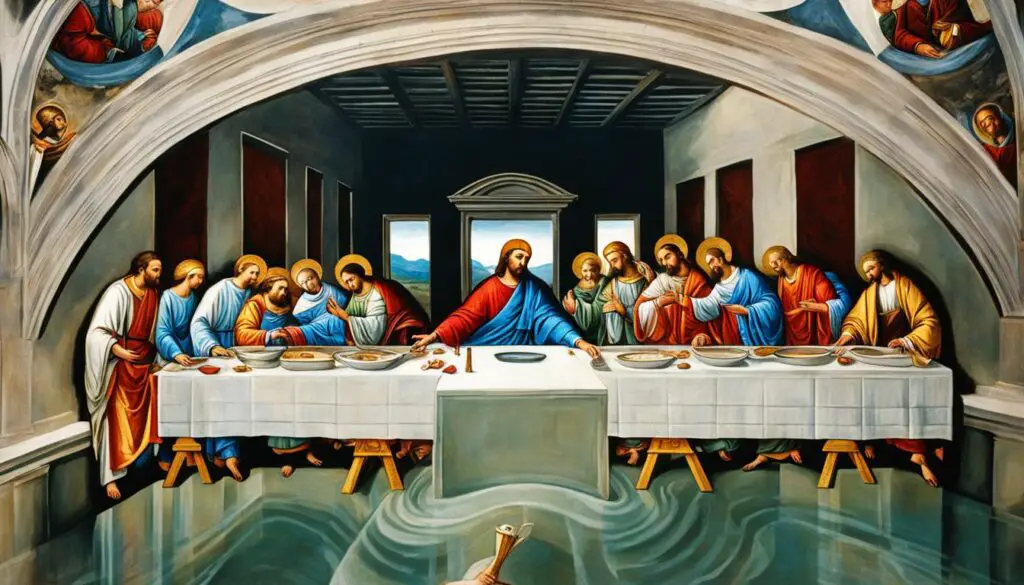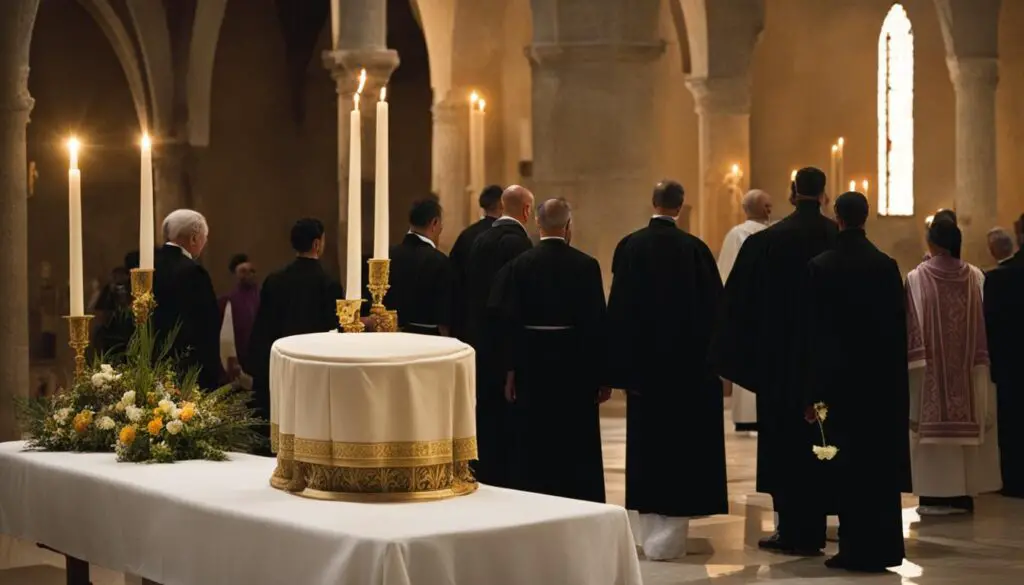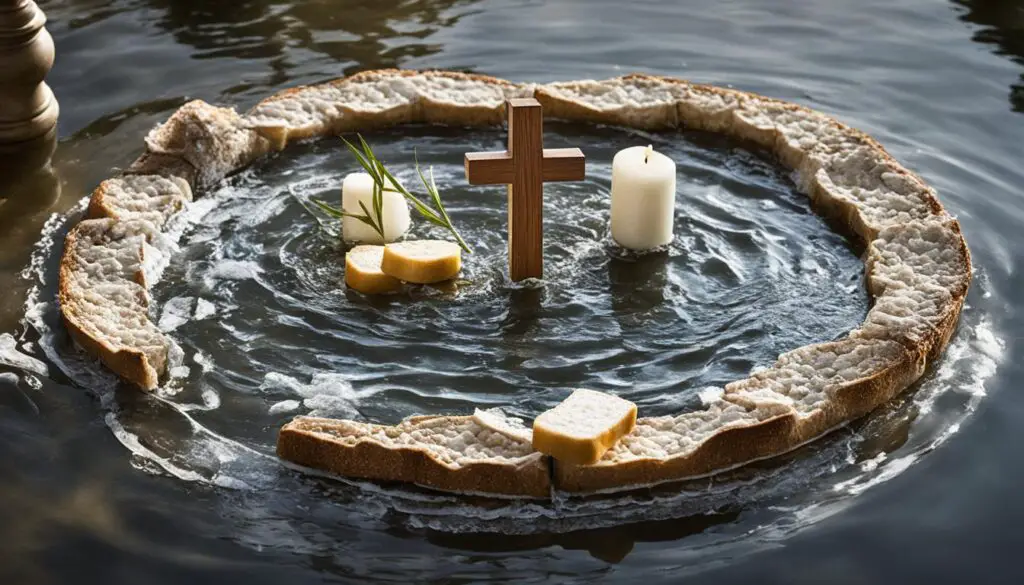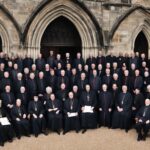Sacraments are more than mere rituals in the Christian faith – they are sacred pathways to spiritual growth, connection, and divine grace. At the heart of these sacraments lie two fundamental pillars: Baptism and Communion. Delving into their history, beliefs, rituals, and challenges is crucial to grasp the profound significance they hold in the lives of believers.
Key Takeaways:
- 1. Baptism and Communion are central sacraments in the Christian tradition, representing initiation and spiritual nourishment.
- 2. Sacraments have deep historical and theological roots, originating from the teachings and actions of Jesus Christ.
- 3. Various Christian denominations may have distinct doctrines and practices concerning the administration of sacraments.
- 4. Sacraments encompass specific rituals and symbols, such as the use of water, bread, and wine, to convey spiritual realities.
- 5. Ordained clergy play a pivotal role in the proper celebration and facilitation of sacraments.
History and Origins of Sacraments
The sacraments have a rich historical and theological background. They are rooted in the teachings and actions of Jesus Christ, who established and instituted these rituals as means of conveying God’s grace to humanity. The concept of sacraments can be traced back to the New Testament, and their significance has evolved throughout the history of Christianity.
“And Jesus came and said to them, ‘All authority in heaven and on earth has been given to me. Go therefore and make disciples of all nations, baptizing them in the name of the Father and of the Son and of the Holy Spirit, teaching them to observe all that I have commanded you.'” – Matthew 28:18-20
The origins of the sacraments can be seen in the actions of Jesus himself. He was baptized by John the Baptist as an act of obedience and identification with humanity. Jesus also instituted the sacrament of Communion during the Last Supper, where he took bread and wine, blessed them, and gave them to his disciples, instructing them to repeat this in remembrance of him.
Throughout the early centuries of Christianity, the understanding and practice of the sacraments developed further. The Church Fathers, such as St. Augustine and St. Thomas Aquinas, contributed to the theological explanation of sacraments, emphasizing their transformative power and the importance of faith in their reception.
Evolution of Sacramental Theology
As Christianity expanded and encountered different cultures, the sacraments adapted to various contexts while maintaining their essential meaning. The sacraments became central to the liturgical life of the Church, signifying initiation, forgiveness, healing, and spiritual nourishment.
Over time, different Christian denominations developed distinct beliefs and practices related to sacraments, resulting in some variations in their administration and theological interpretations. However, the core understanding of sacraments as visible signs of God’s grace remains consistent across denominational lines.
| Sacrament | Beliefs and Significance | Foundational Scripture |
|---|---|---|
| Baptism | Entry into the Christian community, purification of sin, and rebirth in Christ. | Matthew 28:19-20 |
| Communion | Remembering Christ’s sacrifice, receiving spiritual nourishment, and experiencing unity with other believers. | 1 Corinthians 11:23-26 |

Understanding the history and origins of sacraments provides a deeper appreciation for their spiritual significance in the life of the Christian believer. These rituals connect individuals to the teachings and actions of Jesus Christ, conveying God’s grace and fostering a sense of communal identity and spiritual growth.
Beliefs and Doctrines of Sacraments
Sacraments are believed to be essential in the spiritual life of Christians. They are seen as visible signs of invisible grace, conveying God’s love and favor to believers. The beliefs and doctrines surrounding sacraments vary slightly among different Christian denominations, but the fundamental understanding of their efficacy and importance remains consistent.
At the core of sacraments is the belief that they are sacred rituals instituted by Jesus Christ to convey divine grace. They are regarded as channels through which believers can experience a deeper connection with God and receive spiritual nourishment and empowerment.
One key belief in sacraments is the notion of “efficacious signs.” This means that the outward rituals and elements used in the sacraments, such as water in baptism or bread and wine in communion, are not merely symbolic but actually convey the grace they signify. Sacraments are seen as tangible manifestations of God’s presence and transformative power.
“The sacraments are outward and visible signs of inward and spiritual grace, given by Christ as sure and certain means by which we receive that grace.” – The Book of Common Prayer
Another important belief is the sacramental economy, which refers to the way in which God’s grace is mediated through the sacraments. According to this doctrine, the sacraments are not human inventions or rituals but are divine gifts and actions that operate independently of the recipient’s worthiness or the officiant’s holiness. The efficacy of the sacraments is grounded in the power of God’s grace rather than the actions or intentions of human beings.
In addition to the sacraments’ efficacy, believers also hold to the belief in their necessity for salvation and spiritual growth. The sacraments are viewed as essential means through which believers enter into a relationship with God, experience forgiveness of sins, and receive the grace necessary for ongoing spiritual transformation. They are seen as transformative encounters with the divine that strengthen faith, deepen spiritual communion, and empower believers to live out their Christian calling.
| Beliefs and Doctrines of Sacraments: | Description: |
|---|---|
| Efficacious Signs | The outward rituals and elements of sacraments are not merely symbols but convey the grace they signify. |
| Sacramental Economy | The sacraments are divine gifts and actions that operate independently of human worthiness or holiness. |
| Necessity for Salvation | The sacraments are essential for entering into a relationship with God, experiencing forgiveness, and receiving the grace necessary for spiritual growth. |
Through the beliefs and doctrines surrounding sacraments, Christians affirm their conviction that these rituals are not mere traditions or ceremonies but sacred encounters with the divine. They embody the core principles of faith, grace, and community, shaping the spiritual life of believers across different Christian traditions.

Additional Resources:
- What are the Sacraments and Why Do Christians Celebrate Them? – Christianity.com
- The Real Presence by Philip Schaff – Christianity Today
Sacraments and Rituals
Each sacrament is accompanied by specific rituals and practices that give symbolic expression to the spiritual realities they signify. These rituals are deeply rooted in the history and traditions of Christianity, carrying profound meaning and significance for believers.
“The sacraments are visible signs of invisible grace.”
Throughout the centuries, Christians have developed diverse rituals to celebrate and participate in the sacraments. These rituals may involve the use of water, oil, bread, wine, prayers, and other symbolic actions.
For example, in the sacrament of Baptism, water is used to symbolize the cleansing of sin and the new birth into the Christian faith. The individual being baptized is immersed in or sprinkled with water while prayers are recited, symbolizing their initiation into the Christian community and their commitment to following Christ.
In the sacrament of Communion, bread and wine are used to represent the body and blood of Christ. These elements hold deep spiritual significance, reminding believers of Jesus’ sacrifice and inviting them to partake in the sacred meal together as a community.
These sacramental rituals vary in form and significance, reflecting the unique nature and purpose of each sacrament. They are designed to engage the senses, evoke spiritual contemplation, and connect believers to the divine presence. Through these rituals, individuals experience a tangible encounter with God’s grace and deepen their relationship with their faith.
To fully appreciate the sacraments, one must not only understand their historical and theological foundations but also actively engage in the rituals and practices associated with them. These rituals serve as a bridge between the physical and spiritual realms, providing a tangible way for believers to experience the profound mysteries of their faith.
“The rituals of the sacraments bring us closer to the divine and foster a deeper sense of spiritual connection.”
By participating in these sacramental rituals, believers actively affirm their commitment to their faith and strengthen their bond with the Christian community. The sacraments become a source of spiritual nourishment, a reminder of God’s presence in their lives, and a means of personal and communal transformation.

Leadership and Clergy in Sacraments
In most Christian traditions, the administration of sacraments is entrusted to ordained clergy, such as priests or ministers. These dedicated individuals play an essential role in guiding believers in their sacramental journey and ensuring the proper celebration and validity of the sacraments.
As leaders within their congregations, clergy are responsible for facilitating the sacramental rituals, creating a sacred and meaningful experience for the participants. They possess the knowledge and expertise to guide individuals through the sacraments, offering guidance, support, and spiritual counsel along the way. The clergy’s presence adds an element of authority and reverence to the sacramental process, emphasizing the significance and sacredness of these rituals.
Furthermore, clergy act as conduits of God’s grace, serving as intermediaries between the divine and the faithful. Through their ordination and spiritual authority, clergy are seen as vessels through which the sacraments are administered, making them essential in the overall sacramental experience.
Effective leadership and clergy involvement in sacraments are vital for maintaining the integrity and authenticity of these sacred rituals. Their knowledge, experience, and commitment to their congregations help ensure that the sacraments are faithfully practiced and experienced by believers.
Quote:
“Leadership is not about being in charge. It is about taking care of those in your charge.” – Simon Sinek
| Sacraments | Leadership Roles |
|---|---|
| Baptism | Priest or Minister |
| Confirmation | Bishop or Minister |
| Communion | Priest or Minister |
| Confession | Priest |
| Marriage | Officiating Minister |
| Anointing of the Sick | Priest or Minister |
| Holy Orders | Bishop |

Worship Practices and Sacraments
Sacraments hold a central place in Christian worship practices, serving as transformative moments that deepen believers’ connection to God and foster spiritual growth. The celebration of sacraments takes place within the context of religious services, such as Mass or Divine Liturgy. These sacred rituals provide opportunities for communal worship, personal devotion, and encountering the divine presence.
Incorporating sacraments into worship services allows believers to participate actively in their faith, experiencing the tangible presence of God’s grace. The liturgical traditions and practices associated with sacraments vary among different Christian denominations, enriching the diversity and spiritual vibrancy of worship experiences.
Role of Sacraments in Worship
Sacraments play a vital role in the worship life of Christian communities by symbolizing biblical events, embodying spiritual truths, and facilitating communion with God. Whether it is the sacrament of baptism, commemorating the believer’s initiation into the Christian faith, or the sacrament of communion, symbolizing the spiritual nourishment received through the body and blood of Christ, these rituals engage worshippers in a profound encounter with the divine.
Communal Worship and Personal Devotion
“For where two or three gather in my name, there am I with them.” – Matthew 18:20
The celebration of sacraments encourages both communal worship and personal devotion. As believers gather together to participate in these sacred rituals, they are united in their shared faith and create a sense of belonging to a larger spiritual community. Simultaneously, sacraments invite individuals to reflect on their personal relationship with God, offering moments of introspection, renewal, and spiritual transformation.
Spiritual Transformation and Encounter with God
The sacramental experience invites worshippers to encounter the transcendent presence of God in a tangible and transformative way. Through ritual actions, prayers, and participation in the sacraments, believers engage in a deep, inner journey that fosters spiritual growth and a closer relationship with the divine.
By actively participating in sacraments, individuals open themselves to receive God’s grace, forgiveness, and renewal. These transformative encounters empower believers to live out their faith and bring the love and compassion of Christ into the world.

Worship practices and sacraments are intertwined, forming a sacred tapestry that weaves together the spiritual, communal, and personal dimensions of the Christian faith. Through the celebration of sacraments within the context of worship, believers not only engage in acts of devotion but also enter into a profound encounter with the divine, experiencing God’s love, presence, and transformative power.
Sacred Texts and Sacraments
The teachings and narratives found in sacred texts, such as the Bible, play a significant role in shaping the beliefs and understanding of sacraments. Scripture passages are often read, referenced, and interpreted in the context of sacramental celebrations. The biblical stories and teachings related to baptism and the Last Supper form the foundation for these sacraments.
Throughout the Bible, there are numerous accounts of individuals being initiated into the community of faith through baptism. The story of John the Baptist, who baptized Jesus in the Jordan River, is a pivotal moment in Christian history and symbolizes the cleansing and renewal of the baptized individual’s soul.
“I baptize you with water for repentance, but after me will come one who is more powerful than I, whose sandals I am not fit to carry. He will baptize you with the Holy Spirit and with fire.” – Matthew 3:11
The Last Supper, as described in the Gospels, is the basis for the sacrament of communion or the Eucharist. Jesus shared bread and wine with his disciples, instructing them to do the same in memory of him. This act of communion represents the spiritual nourishment and unity of believers with Christ and each other.
“While they were eating, Jesus took bread, and when he had given thanks, he broke it and gave it to his disciples, saying, ‘Take it; this is my body.’ Then he took a cup, and when he had given thanks, he gave it to them, and they all drank from it. ‘This is my blood of the covenant, which is poured out for many.'” – Mark 14:22-24
These sacred texts provide the theological foundation for the sacraments of baptism and communion, guiding believers in their understanding and practice of these rites. They serve as a source of inspiration, guidance, and reflection, deepening the spiritual significance of sacraments in the lives of Christians.
Scripture References for Sacraments
| Sacrament | Scripture References |
|---|---|
| Baptism |
|
| Communion |
|
These scripture references serve as a starting point for individuals to explore the biblical basis and significance of these sacraments. By studying and reflecting upon these passages, believers can gain a deeper appreciation for the divine wisdom and purpose behind sacramental practices.
Denominations and Sects in Sacraments
Within Christianity, there exists a diverse landscape of denominations and sects, each with its distinct perspectives and practices concerning the sacraments. While the fundamental sacraments of baptism and communion are universally recognized, the ways in which they are understood, administered, and emphasized can vary greatly among different traditions. These variations are influenced by theological, historical, and cultural factors, shaping the sacramental experiences of believers.
Denominations such as Roman Catholicism, Eastern Orthodoxy, and Anglicanism place a strong emphasis on the sacraments, viewing them as essential for salvation and communion with God. The administration of sacraments within these traditions is often performed by ordained clergy and follows prescribed rituals and liturgies. The sacraments are believed to confer grace and act as tangible signs of God’s presence and blessings.
Protestant denominations, on the other hand, exhibit a wide range of perspectives regarding the sacraments. Some, like Lutheranism and Reformed Christianity, uphold the sacraments of baptism and communion as necessary for the faith journey, viewing them as means of receiving God’s grace. Others, like the Baptist and Pentecostal traditions, prioritize symbolic and personal experiences of faith, emphasizing individual conversion and spiritual empowerment over sacramental rituals.
Furthermore, within denominations, there may be sects or movements that deviate from the mainstream practices. These sects, often characterized by unique doctrinal interpretations or liturgical styles, may approach the sacraments in unconventional ways. They may also emphasize additional sacraments beyond baptism and communion, recognizing rituals such as confirmation, confession, or anointing of the sick.
The diversity of denominations and sects within Christianity adds richness and complexity to the sacramental landscape. It reflects the dynamic nature of faith and the way in which believers engage with and express their spirituality. While the core sacraments remain constant, the denominational and sectarian differences provide individuals with a range of options and perspectives, allowing them to find a spiritual home that resonates with their beliefs and practices.
| Denomination/Sect | Perspective on Sacraments |
|---|---|
| Roman Catholicism | Emphasis on the sacraments as essential for salvation and communion with God. Administered by ordained clergy following prescribed rituals and liturgies. |
| Eastern Orthodoxy | Belief in the sacraments as tangible signs of God’s presence and blessings. Sacraments administered in accordance with ancient traditions and liturgies. |
| Anglicanism | Recognition of the sacraments as means of receiving God’s grace. Sacraments administered by ordained clergy following Anglican liturgical practices. |
| Lutheranism | Upholding the sacraments of baptism and communion as necessary for the faith journey. Sacraments administered in accordance with Lutheran traditions and liturgies. |
| Reformed Christianity | Emphasis on the sacraments as tangible expressions of God’s grace. Sacraments administered within the context of Reformed worship and theology. |
| Baptist | Symbolic and personal experiences of faith take precedence. Baptism seen as an individual’s public declaration of faith, and communion often celebrated as a memorial. |
| Pentecostal | Focus on spiritual empowerment and the personal experience of God’s presence. Sacraments viewed as symbolic acts of faith rather than channels of grace. |
| Mormonism | Recognition of additional sacraments such as baptism for the dead and the sacrament of marriage. Emphasis on eternal progression and salvation through sacramental ordinances. |
The table above highlights the perspectives on sacraments within different Christian denominations and sects. This overview demonstrates the diversity of beliefs and practices, illustrating how the sacraments are understood and celebrated across various religious traditions.
Community and Outreach through Sacraments
Sacraments are not merely private encounters with the divine; they hold the power to foster a sense of community and extend outreach to those in need. These sacred rituals serve as constant reminders of our shared faith and offer invaluable opportunities for believers to come together in communal worship, offering spiritual support, and forging deep bonds. Through sacraments, individuals find solace and strength in the presence of fellow believers, creating a vibrant and connected community.
The communal nature of sacraments is exemplified in the sacrament of Communion, where believers come together to partake in the symbolic sharing of bread and wine, representing the body and blood of Jesus Christ. This act reinforces the unity and interconnectedness among the faithful, reminding them that they are all part of the larger body of Christ.
Furthermore, sacraments inspire believers to engage in acts of service and outreach to others, embodying the teachings of love, compassion, and selflessness exemplified by Jesus. The sacramental experience instills a deep sense of gratitude and mission, urging individuals to extend their faith beyond the walls of the church and into their communities. By engaging in acts of service and outreach, believers embody the transformative power of sacraments, uplifting those in need and spreading the message of love and hope.
“The sacraments serve as a unifying force, bringing believers together in worship and prompting a collective commitment to social justice and care for others.”
Through the sacrament of Baptism, individuals are initiated into the Christian community, symbolizing their commitment to the faith and their acceptance into the larger body of believers. This initiation into the community is a powerful reminder that Christians are called to live and serve together, supporting one another and reaching out to those who are marginalized or in need.
In essence, sacraments go beyond the individual and create a sense of unity and purpose within the community of believers. Whether through the celebration of Communion or the initiation of Baptism, these sacred rituals inspire believers to actively participate in their communities, fostering outreach, and embodying the love of Christ in their everyday lives.
Architectural and Artistic Features in Sacraments
The celebration of sacraments often takes place in architectural spaces specifically designed for worship. Churches, cathedrals, and other sacred structures are meticulously crafted to create an atmosphere conducive to spiritual contemplation and reverence. These sacred spaces often showcase unique architectural elements and artwork that enhance the sacramental experience.
The architecture of these sacred buildings often reflects the beliefs and values of the Christian community. From towering spires and grand facades to intricate stained glass windows and ornate entrances, every aspect of the architectural design serves a purpose in creating a sacred and awe-inspiring environment. The use of arches, vaults, and domes not only adds to the visual appeal but also symbolizes the transcendence of the divine.
Within these sacred spaces, certain architectural features hold particular significance in relation to the sacraments. The baptismal font, for instance, is a prominent fixture in churches where the sacrament of baptism takes place. Typically positioned near the entrance, the font serves as a visual representation of the cleansing and rebirth that occurs during baptism. It is often designed to resemble a basin or pool, symbolizing the washing away of sins and the entrance into the Christian community.
Another essential architectural element in sacramental celebrations is the altar. The altar serves as the focal point of the worship space and is where the sacrament of communion, also known as the Eucharist, is performed. It is often elevated and adorned with religious artwork, including statues, crucifixes, and candles, creating a visually captivating centerpiece for the sacramental celebration.
“The architectural and artistic elements within churches and cathedrals engage the senses and provide a tangible connection to the divine. They create a sacred space where believers can encounter the sacraments and experience the presence of God.”
Stained glass windows are another captivating feature of many churches and cathedrals. These windows are meticulously crafted to depict biblical scenes, saints, and religious symbols, flooding the interior with colorful light and creating a transcendent atmosphere. The interplay of light and imagery invites worshippers to contemplate the divine mysteries and find inspiration in their faith.
Religious sculptures and paintings are also commonly found in churches, adding an artistic dimension to the sacramental experience. Sculptures of saints, angels, and biblical figures serve as visual reminders of the Christian narrative and provide inspiration for prayer and meditation. Paintings and murals often adorn the walls and ceilings, depicting significant religious events and serving as visual representations of the divine presence.
| Architectural Features | Symbolism |
|---|---|
| Baptismal font | Symbolizes cleansing and rebirth |
| Altar | Serves as the focal point for sacramental celebrations |
| Stained glass windows | Depict biblical scenes and religious symbolism |
| Sculptures and paintings | Provide visual reminders of the Christian narrative |
The architectural and artistic features found within churches and cathedrals not only add beauty and solemnity to worship spaces but also play a crucial role in enhancing the sacraments. They create a sacred ambiance, engage the senses, and provide a tangible connection to the divine. Whether through striking stained glass windows, intricate statues, or awe-inspiring altars, these elements enrich the sacramental experience, inviting believers to encounter God and deepen their faith.
Contemporary Issues and Challenges in Sacraments
The practice and understanding of sacraments are not immune to contemporary issues and challenges. In today’s diverse and ever-changing world, debates often arise regarding the eligibility and validity of certain sacraments, such as baptism or communion. These debates stem from differing theological perspectives and interpretations of scripture, as well as evolving societal norms.
One of the key contemporary issues is inclusivity within sacramental practices. Many Christian denominations and communities are grappling with questions of who should be eligible to receive the sacraments. This includes debates over the inclusion of LGBTQ+ individuals, those in non-traditional relationships, or those who have not been formally initiated into the faith through baptism. The challenge lies in finding a balance between maintaining theological integrity and embracing a spirit of inclusivity and acceptance.
Interfaith dialogue also presents a challenge to the understanding and practice of sacraments. In an increasingly interconnected world, individuals from different religious backgrounds may come together in shared spaces and communities. This raises questions about the sacraments’ exclusivity to Christian practice and how they can be approached in a way that respects and engages with other religious traditions.
“The challenge lies in finding a balance between maintaining theological integrity and embracing a spirit of inclusivity and acceptance.”
Additionally, the role of sacraments in modern society is an ongoing topic of discussion. As religious affiliation and participation decline in some areas, there is a need to examine how sacraments can remain relevant and impactful in the lives of believers. This includes exploring innovative ways to engage with sacramental rituals, such as incorporating technology or adapting traditional practices to meet the needs and preferences of contemporary worshippers.
Conclusion
The sacraments of baptism and communion hold immense significance in the Christian faith, representing pivotal moments of initiation, grace, and spiritual nourishment. Understanding the history, beliefs, rituals, challenges, and contemporary issues surrounding sacraments enables individuals to deepen their appreciation for these sacred practices and their role in fostering spiritual growth and community.
Baptism, the sacrament of initiation, symbolizes the cleansing of sin and rebirth into a life of faith. Through the ritual of water immersion or pouring, believers publicly declare their commitment to Christ and their acceptance into the Christian community. It serves as a powerful reminder of God’s grace and a call to live a transformed life.
Communion, also known as the Eucharist or the Lord’s Supper, is an essential sacrament that signifies the ongoing connection between believers and Christ. The sharing of bread and wine represents the body and blood of Christ, imparting spiritual nourishment and uniting believers in their shared faith. This sacred ritual embodies the presence of Christ and invites believers to remember his sacrifice and live in communion with one another.
Throughout history, sacraments have been practiced in various ways, reflecting the diversity of Christian beliefs and denominations. Ordained clergy play key roles in administering the sacraments, ensuring their proper celebration and validity. Sacraments are integrated into worship practices, emphasizing their communal and transformative nature. The teachings and narratives found in sacred texts, such as the Bible, shape the understanding and significance of sacraments.
FAQ
What are the sacraments in the Christian faith?
The sacraments in the Christian faith are sacred rituals that represent pathways to spiritual growth and community.
What are the two fundamental sacraments in the Christian tradition?
The two fundamental sacraments in the Christian tradition are Baptism and Communion.
What is the historical background of the sacraments?
The sacraments have a rich historical and theological background rooted in the teachings and actions of Jesus Christ.
What do sacraments symbolize in Christianity?
Sacraments are believed to be visible signs of invisible grace, signifying God’s love and favor to believers.
What rituals are associated with sacraments?
Sacraments are accompanied by specific rituals and practices, often involving water, oil, bread, wine, prayers, and other symbolic actions.
Who administers the sacraments?
In most Christian traditions, ordained clergy, such as priests or ministers, are responsible for administering the sacraments.
How are sacraments integrated into worship practices?
Sacraments are celebrated within the context of religious services, such as Mass or Divine Liturgy, providing opportunities for communal worship and personal devotion.
What role do sacred texts play in the understanding of sacraments?
Sacred texts, such as the Bible, contain teachings and narratives that shape the beliefs and understanding of sacraments.
Are there variations in the practices of sacraments within different Christian denominations?
Yes, different Christian denominations may have varying perspectives and practices concerning the administration and emphasis of sacraments.
Do sacraments foster community and outreach?
Yes, sacraments serve as opportunities for communal worship, spiritual support, and acts of service and outreach among believers.
What architectural and artistic features are associated with sacraments?
Churches and sacred structures often feature baptismal fonts, altars, stained glass windows, and religious sculptures that enhance the sacramental experience.
What are some contemporary issues and challenges related to sacraments?
Contemporary issues and challenges surrounding sacraments include debates on eligibility, inclusivity, interfaith dialogue, and their relevance in modern society.
How do sacraments contribute to spiritual growth and community?
Sacraments, particularly baptism and communion, hold profound significance in Christian faith, symbolizing initiation, grace, community, and spiritual nourishment.
















